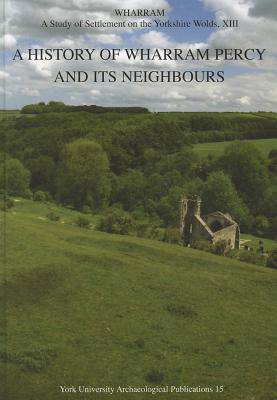
En raison d'une grêve chez bpost, votre commande pourrait être retardée. Vous avez besoin d’un livre rapidement ? Nos magasins vous accueillent à bras ouverts !
- Retrait gratuit dans votre magasin Club
- 7.000.000 titres dans notre catalogue
- Payer en toute sécurité
- Toujours un magasin près de chez vous
En raison de la grêve chez bpost, votre commande pourrait être retardée. Vous avez besoin d’un livre rapidement ? Nos magasins vous accueillent à bras ouverts !
- Retrait gratuit dans votre magasin Club
- 7.000.0000 titres dans notre catalogue
- Payer en toute sécurité
- Toujours un magasin près de chez vous
Wharram XIII
A History of Wharram Percy and Its Neighbours
46,95 €
+ 93 points
Description
The final volume in the series Wharram: A Study of Settlement on the Yorkshire Wolds charts the history of Wharram Percy from later prehistoric times down to the 16th century. The first part of the volume summarises the excavation programme and discusses key influences on the methods and techniques adopted at Wharram. It also introduces the results of earthwork and geophysical surveys carried out since the end of the excavations, and explores their role in generating new understandings of Wharram's settlement history. Part Two reviews the evidence for fields and farms in the Wharram area in later prehistoric and Roman times, and identifies some key social changes that took place during those periods. It also presents arguments in support of the hypothesis that the northern Wolds reverted to grazing grounds for surrounding lowland communities in the immediate post-Roman centuries. Evidence for re-establishment, in the Middle Saxon period, of permanent settlement at Wharram and in neighbouring parts of the Wolds is presented and debated in Part Three. The creation of the earliest elements of the medieval village plan, along with the burial ground, church and mill in the Late Saxon period is examined and debated in the context of Scandinavian overlordship in the locality. The fourth part of the volume outlines the history of lordship at Wharram Percy from the 12th century onwards, and discusses the impact of lordship on the fabric of the village and its church. Evidence for the fields and farms, homes and daily lives of peasant farmers both at Wharram and in nearby communities is also explored, and the circumstances of depopulation and desertion are re-examined.
Spécifications
Parties prenantes
- Editeur:
Contenu
- Nombre de pages :
- 403
- Langue:
- Anglais
- Collection :
- Tome:
- n° 13
Caractéristiques
- EAN:
- 9780946722228
- Date de parution :
- 17-02-12
- Format:
- Livre relié
- Format numérique:
- Genaaid
- Dimensions :
- 208 mm x 297 mm
- Poids :
- 1796 g

Les avis
Nous publions uniquement les avis qui respectent les conditions requises. Consultez nos conditions pour les avis.





